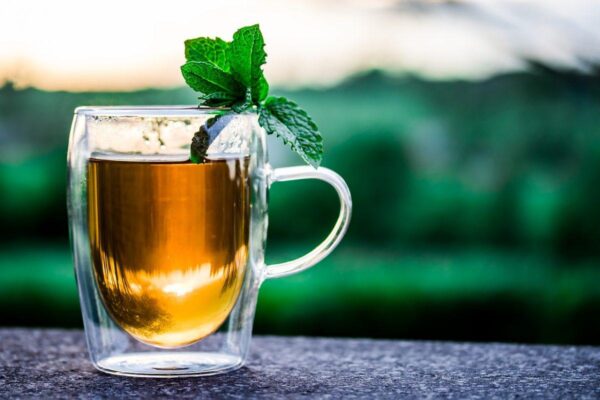Hey, my lovely health-conscious readers! Gas and bloating are issues that we all experience and it is essential to know how to deal with these issues. The most effective solutions are obviously, herbal solutions! says “Wellhealthorganic.com:5-Herbal-Teas-You-Can-Consume-To-Get-Relief-From-Bloating-And-Gas” Many people use natural remedies to alleviate these symptoms, such as herbal teas.
Herbal teas have been utilized for centuries to boost overall well-being and health. Some are particularly effective in treating digestive problems. In this article we’ll discuss gas and bloating, as well as how it is associated with the process of bloating. We also talk about the various herbal teas and how to make every one of them, as talked about in “Wellhealthorganic.com:5-Herbal-Teas-You-Can-Consume-To-Get-Relief-From-Bloating-And-Gas.”
Also Read:
What is bloating according to “Wellhealthorganic.com:5-Herbal-Teas-You-Can-Consume-To-Get-Relief-From-Bloating-And-Gas”?
Bloated stomachs is, in the first place, is the sensation of pressure, tightness or fullness in your abdomen. It could or might not be accompanied by an expanding abdomen. The feeling can be moderately uncomfortable to painfully so. The discomfort usually disappears after a time, but for some who experience it, it is a problem. Bloating cycles can result from digestive problems or fluctuations of hormones.
10 percent to 25 percent of people who are healthy have reported occasional abdominal constipation. As high as 75% of those surveyed have mild to moderate symptoms. 10% of the people surveyed claim to experience it regularly. IBS sufferers may experience it for up to 90 percent of the times. Women may experience bloating up to 75 percent of the time, in both the days before and during menstrual cycles. About half of women who complain of bloating also have an abdominal enlargement.
Also Read:
Gas
Gas is an inevitable byproduct of digestion, however persistent gas in the intestines indicates a digestive issue. According to “Wellhealthorganic.com:5-Herbal-Teas-You-Can-Consume-To-Get-Relief-From-Bloating-And-Gas” Gases can be ingested by breathing in air or drinking carbonated beverages, but the vast majority are belched out before reaching your intestines. Gases are created primarily in the intestines of your body as a result of the process of fermentation that takes place when gut bacteria breakdown carbohydrates.
A large amount of carbohydrates which should have been taken in earlier during the digestive process, prior to reaching the bacteria in the gut, were not able to absorb them, resulting in an excess of fermentation. There are a variety of reasons that could be behind this. Perhaps your digestion was affected by eating fast. It is also possible that you suffer from a digestive problem or food intolerance.
Wellhealthorganic.com:5-Herbal-Teas-You-Can-Consume-To-Get-Relief-From-Bloating-And-Gas: The best herbal teas
As talked about in “Wellhealthorganic.com:5-Herbal-Teas-You-Can-Consume-To-Get-Relief-From-Bloating-And-Gas,” herbal teas are an amazing solution to deal with bloating and gas. This is due to many reasons. The process of making herbal tea is very Ayurvedic in nature, meaning it is the treatment is based on the use of natural remedies!
The top 5 herbal teas to relieve gas and bloating are:
Peppermint
The peppermint plant (Mentha piperita) has been utilized for a long time in traditional medicine due to its digestive-soothing properties. Research on peppermint plant components in test tubes as well as animals indicated that reducing the function of immune cells in the gut could cause the bloating. Research on peppermint plant components in test tubes as well as animals indicated that reducing the function of immune cells in the gut could cause the bloating. Peppermint oil capsules can help in the treatment of digestive symptoms like gastric pain and bloating.
Also Read: wellhealthorganic.com:diet-for-excellent-skin-care-oil-is-an-essential-ingredient
- Natural Antispasmodic:The antispasmodic properties of peppermint menthol compound help relax the smooth muscles of the digestive tract. Through relaxing, bloating and gas-related cramps, spasms and discomfort are reduced.
- Carminative Qualities: The peppermint plant also contains carminative properties, which aid in helping the body eliminate gas. It can help reduce the sensation of fullness and bloating after a meal.
- Enhances Bile Production and Digestive Enzyme Secretion Peppermint tea is a great way in promoting bile production as well as the release of digestive enzymes. This enhances digestion and stops gas from accumulating in the stomach and intestines.
Wellhealthorganic.com:5-Herbal-Teas-You-Can-Consume-To-Get-Relief-From-Bloating-And-Gas | How to make Peppermint tea?
- Water that is boiling: Bring a cup of water in a pot or kettle until it’s at an unbroken boiling.
- Prepare the leaves of peppermint: Use fresh peppermint leaves after giving them an easy rinse before rubbing them dry. Reserve 1-2 teaspoons of dry leaves.
- The leaves should be soaked: Fill a teapot or cup with dried or fresh peppermint leaves. Once the water has been boiled and sprinkled over the leaves, let them sit for 5-10 minutes.
- Serve and strain:After steeping, tea must be strained to get rid of the leaves prior to pouring into the cup. Based on your preferences the tea can be consumed hot or cold.
- Make your own tea: To enhance the flavor of your peppermint tea consider adding lemon, honey or cinnamon sticks. However, you must stay away from sugar, as it can cause gas and make you feel bloated and uncomfortable.
Also Read: wellhealthorganic.com:red-chilli-you-should-know-about-red-chilli-uses-benefits-side-effects
Lemon balm
It is believed that the Mediterranean region is the place where lemon balm, called Melissa officinalis, is grown. Gastric issues that are mild like gas and bloating have historically been addressed with lemon balm. It is also an important portion of Iberogast. This digestive supplement of “Wellhealthorganic.com:5-Herbal-Teas-You-Can-Consume-To-Get-Relief-From-Bloating-And-Gas” also contains a number of herbal extracts that may help with symptoms of digestive discomfort like constipation and pain in the abdomen. Studies on animals suggest that lemon balm can also help promote regularity and reduce the frequency of intestinal spasms. Further research is required because the effects of lemon balm, or its tea on digestion issues of people need to be studied separately.
- The effect of spasms on the body: Lemon balm tea is an antispasmodic, relaxing gastrointestinal spasms and cramps which can cause gas and bloating. It does this by relaxing the muscles of the digestive tract.
- Carminative effect The lemon balm plant can help to eliminate gas from the digestive tract, which reduces the discomfort and bloating. This is because of its carminative qualities.
- The effects of calming Anxiety and stress may sometimes aggravate digestive problems like bloating and gas, however lemon balm tea is known to have calming properties which can ease these symptoms.
How do I create Lemon Balm Tea?
- Get water up to boiling:Heat a cup of water.
- The tea should be brewed in the following manner: Put a teacup with two teaspoons of dried lemon balm leaf or the lemon balm tea bag inside it. Pour the hot water on the leaves and allow them to sit for 5 to 10 minutes.
- Strain and, if you want sweeten the tea: Use a strainer to remove the leaves of the tea, if you’re using lemon balm leaves that are loose. If you’d like to sweeten your tea, you can use Stevia or honey; however avoid sugar as it may cause gas and gastric bloating.
- Relax and drink: Warm tea should be taken slowly in order to enjoy the benefits of its relaxing properties. Gas and bloating can be cured through drinking tea made of lemon balm up to three times a day and preferably before meals.
Fennel
The Fennel (Foeniculum vulgare) is a fragrant plant belonging to the Apiaceae family. The seeds of the plant have a variety of healing properties, especially for digestion, because of its presence in active ingredients like Anethole. Fennel tea according to “Wellhealthorganic.com:5-Herbal-Teas-You-Can-Consume-To-Get-Relief-From-Bloating-And-Gas” is a tasty and healthy way to relieve gas and bloating. The carminative and antispasmodic qualities help in soothing the digestive tract, elimination of gas accumulation, and overall improvement in digestion health. Consuming fennel tea on regularly basis can ease gas and bloating, while improving the health of your digestion.
- Natural Antispasmodic: Fennel is anethole-rich plant which is antispasmodic and can aid in relaxing the muscles that smooth your digestive tract. Relaxation can ease spasms, cramps, and discomfort that is caused by gas and bloating.
- Carminative properties: Carminative qualities of fennel aid in eliminating gases from your digestive tract. This can reduce the feeling of bloating and feeling of being full after eating.
- Enhances Bile Production and Digestive Enzyme Secretion Fennel tea may increase the production of bile and digestive enzyme secretion, enhancing digestion overall and preventing gas build-up within the stomach as well as the intestines.
How do I create Fennel tea?
- Water that is boiling: In a pot or kettle prepare one cup of water up to an unrestricted boil.
- Make the seeds of fennel in this manner: Take 1-2 teaspoons of fennel seeds that have been crushed.
- The seeds should be soaked: Put the ground seeds of fennel in the teapot or cup. Put aside for 10 minutes, after adding boiling water to the seeds.
- Serve and strain:Pour the tea into one cup after straining the tea to rid it of the seeds. Based on your preferences the tea can be consumed hot or cold.
- Customize your tea To increase the taste of fennel tea include lemon, honey, or cinnamon sticks. Sugar, which can trigger the gastric and abdominal pain, must be kept away from.
Also Read: wellhealthorganic.com:winter-skin-care-tips-home-remedies-to-keep-your-skin-moisturised
Ginger
Ginger tea is utilized to treat digestive problems from the beginning of time. According to research the daily dosage of 1-1.5 grams of ginger capsules split in two doses can help decrease nausea. Supplements that contain artichoke and ginger are also proven to increase the flow of food through the digestive tract and help reduce discomfort in the digestive tract.
- Natural Antispasmodic: Ginger’s antispasmodic qualities help to relax the smooth muscles of the digestive tract. Relaxation can ease spasms, cramps and pain that are caused by gas and bloating.
- Carminative properties:Ginger is also known for its carminative properties, which aid the body eliminate gas from the digestive system. This may help to reduce the feeling of bloating after eating and also fullness.
- Enhances the Digestive function: Ginger tea may stimulate digestion enzymes, which can aid in digestion overall. The improved digestion may help stop the buildup of gas in the stomach and intestines.
How do I create Ginger tea?
- Water that is boiling:Heat one cup of water in a pot or kettle until it reaches an unremitting boil.
- Make the ginger Slice or cut a small slice (about 1 to 2 inches) from fresh ginger. 1 teaspoon of ginger powder that has been dried should be utilized.
- Make sure to steep the ginger: Fill a teapot or cup half way with freshly cut ginger or ginger powder. After you cover the ginger with boiling water, let it sit for 5 to 10 minutes.
- Serve immediately after the straining process: After the tea has brewed then strain it through a sieve to get rid of the pieces of ginger or powder, and then pour it into the cup. The way you prefer it will determine if you prefer to drink the tea chilled or hot.
- Make your own tea: By adding lemon, honey, or the cinnamon stick, you can enhance the taste that your tea contains. Don’t add sugar because it could cause bloating and gas!
Also Read: wellhealthorganic.com:11-health-benefits-and-side-effects-of-olives-benefits-of-olives
Chamomile
The chamomile (Matricaria Chamomilla) is one of the daisy family members with small white blooms. According to some old research conducted on animals and test tubes Chamomile can help protect against Helicobacter Pylori bacterial infections which are the causes of stomach ulcers and can cause constipation. Chamomile is among the herbs used in Iberogast which is a supplement that has been proven to alleviate stomach ulcers and pain. Human studies are needed to verify the benefits for digestion of the chamomile tea.
- The effect of spasms on the body: Chamomile tea eases digestive muscles, which reduces cramps and spasms that may cause gas and bloating.
- Properties that reduce inflammation: Flavonoids, which contain anti-inflammatory properties, can be present in the chamomile tea. The reduction in inflammation of the gastrointestinal tract can assist in relieving gas and bloating.
- Carminative effect The carminative properties of chamomile tea assist in eliminating stomach gas, which reduces the discomfort and bloating.
How do I create Chamomile tea?
- Bring water to a boil: Heat a cup of water. boil.
- Make tea: Add one or two teaspoons of dried chamomile flowers, or an chamomile tea bag into the teacup. After placing the flowers into boiling water, let them infuse for 5-10 minutes.
- Sweeten and strain:If using loose chamomile flowers Strain the tea to get rid of the flowers. To sweeten the tea, you can use honey or stevia. Sugar however could cause gas and gastric bloating.
- Relax and drink: To experience the relaxing effects of tea take a sip slowly. Consume chamomile tea three times a day to ease gas and bloating, best at the end of meals.
Also Read: wellhealthorganic.com:facial-fitness-anti-aging-facial-exercises-to-look-younger-every-day
Conclusion
In relation to “Wellhealthorganic.com:5-Herbal-Teas-You-Can-Consume-To-Get-Relief-From-Bloating-And-Gas,” we talked about what bloating is and how gas affects bloating. We also talked about the various herbal teas as we talk about “Wellhealthorganic.com:5-Herbal-Teas-You-Can-Consume-To-Get-Relief-From-Bloating-And-Gas” and we also told you how to make these herbal teas! We also discuss the different ways that they can benefit our digestion and diet. In the conclusion of the day, Ayurvedic remedies can aid us in maintaining our well-being!



